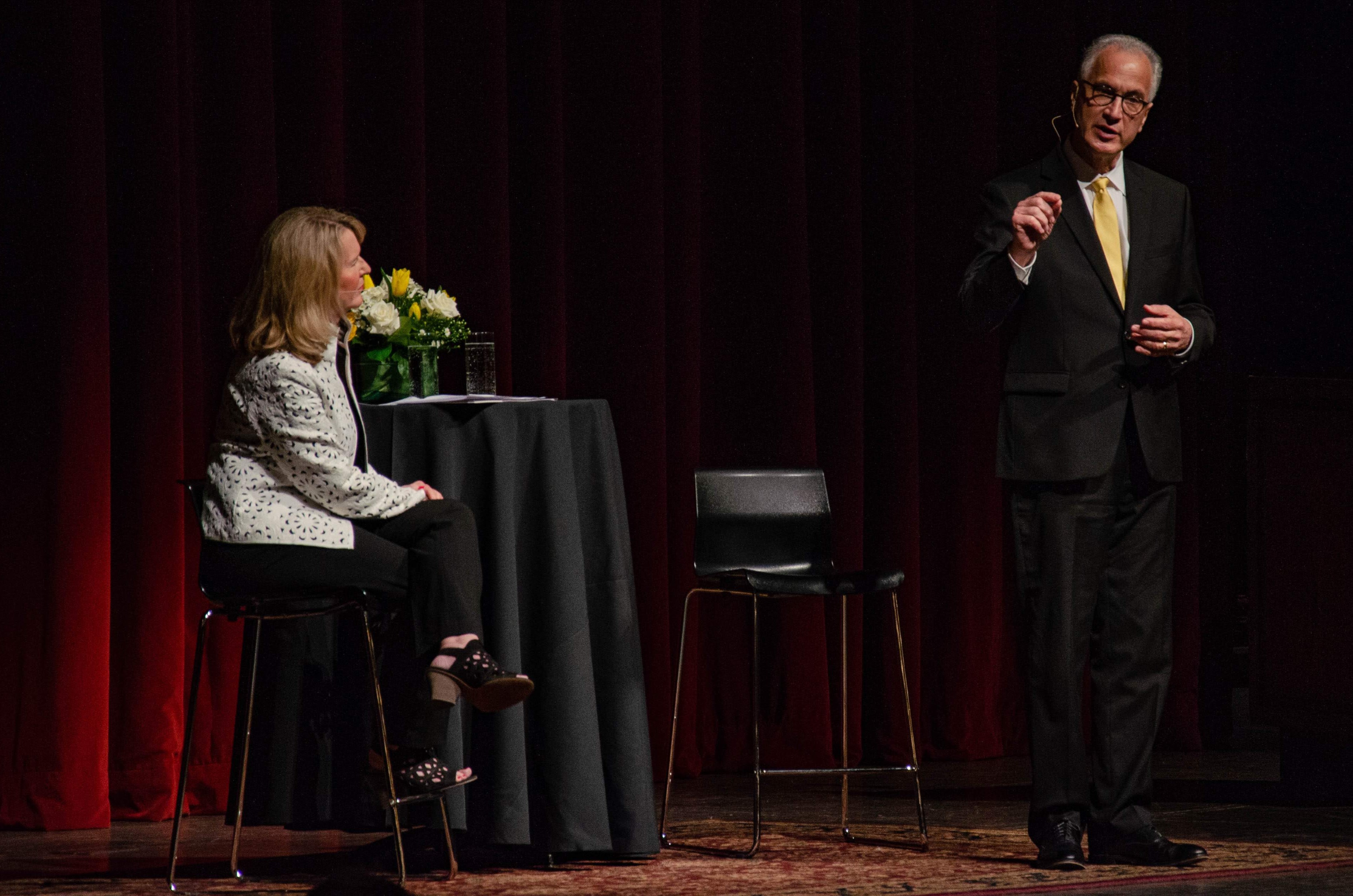
Mark Kennedy speaks to an audience at Macky Auditorium as part of a series of CU campus visits. April 26, 2019 (Hunter Allen/CU Independent)
Mark Kennedy, the sole finalist for CU president, received a rough welcome from the University of Colorado Boulder audience today.
Boulder marked the last campus visit of Kennedy’s weeklong tour, during which he addressed a crowd in Macky Auditorium before meeting with campus leaders — a meeting which was closed to media and the public.
A small group of protestors gathered outside Macky, handing flyers to passerby and encouraging students to call the Board of Regents and voice their concerns about Kennedy’s nomination. The current President of the University of North Dakota faces widespread criticism from the CU community, mainly for his track record in Congress, where he voted for measures to oppose gay marriage, restrict abortion access and ban stem cell research. A campus protest was held last week to oppose his nomination, and a student group, “CU Against Kennedy”, has formed.
Of the several options that students are pursuing in order to avoid a Kennedy presidency, one is flipping the Regents to vote against Kennedy’s confirmation come May 2. According to Susan Greene, Colorado Independent editor, Regent Linda Shoemaker (D) and Irene Griego (D) plan to vote against Kennedy.
CU Regents Linda Shoemaker and Irene Griego say they will be voting against hiring former Republican Congressman Mark Kennedy as
the university's next president.— Susan Greene (@Greeneindenver) April 26, 2019
The forum was moderated by Regent Chair Sue Sharkey was accompanied by several other Regents. CU Boulder Chancellor Philip DiStefano gave opening remarks, reminding the audience that respectful discourse and discussion is a core value of the university.
Defending his record
Sharkey began the forum by welcoming the audience and thanking people for taking the time to attend. She asked that audience questions be directed to Kennedy and to avoid asking about the presidential selection process, which prompted laughter and boos from the audience. She encouraged people to read the letter sent out from the Board of Regents in order to gain more information.
Kennedy began with his story of being a first-generation college student, an opening that he replicated from his previous campus visits. He called his visit to CU’s flagship campus an “honor” before going on to call CU the flagship of the entire mountain west region.
Kennedy discussed his track record in business, politics and academia, and said that none of his success would have been possible without access to education. He believed his experiences at George Washington University and UND made him well-prepared to lead the University of Colorado, and that he was passionate about helping the university advance.
Defending his reputation on diversity, Kennedy said he left the leadership of UND more diverse than it was when he first arrived and is committed to making CU the most inclusive campus in academia. However, Kennedy several times mixed up the words “inclusive” and “exclusive” when speaking, prompting laughter and jeers from the crowd. Interjections from the audience were common throughout the forum, even being told to “wrap it up!” by one audience member.
Among a variety of concerns from the audience was Kennedy’s anti-LGBTQ voting record, which he also defended. He cited reaching out to One Colorado, an LGBTQ advocacy organization, to help form an advisory committee for him at CU. When asked how he planned to address LGBTQ issues, he made numerous references to the organization and its values.
Sheena Kadi, One Colorado’s deputy director, said in an email to the CU Independent the organization met with Kennedy and several Regents yesterday to discuss issues important to the LGBTQ community within Colorado. Executive Director and CU alum Daniel Ramos plans to serve on a committee that will keep Kennedy current on community issues and consult with him “to ensure that CU continues to be a diverse and inclusive environment.”
Sharkey then asked asking Kennedy questions which focused on what he had done to promote diversity in the past, how he had handled budget cuts at UND and what made him qualified to lead a large, tier-1 research institution like CU. UND has only about 15,000 students, while the CU system has a combined total of 64,000. Kennedy used his experience as a businessman to justify his qualifications, saying that during his business career he worked at organizations that were larger and just as complex as CU.
Audience pushback

A heated crowd questions CU presidential finalist Mark Kennedy. April, 26, 2019 (Hunter Allen / CU Independent)
The Regents Chair later opened the floor to questions from the audience. Questions became more heated as audience members circled back to Kennedy’s voting record as well as the Regents’ selection process.
Kennedy deferred all questions about the process to the Regents, and at times evaded direct answers, which prompted frustration from the audience. When asked about his anti-LGBT voting record, he frequently asked people to look at his track record in academia or would point to more progressive bills that he voted for while in Congress. Yells to “be more specific” in his answers were frequent from audience members.
One man asked how Kennedy believed that the U.S. would be better off if the bill to create a constitutional amendment banning gay marriage — which Kennedy cosponsored — passed. Kennedy responded, “we would not have been better off,” and spoke instead about a bill he led to invest more money in HIV/AIDS research, drawing a distinction between bills that he was a leader on and bills that he cosponsored.
In 2004 and 2006 Kennedy voted for and cosponsored bills to constitutionally define marriage as between a man and a woman. In his open letter, Kennedy said his position on same-sex marriage has “evolved” in the decade-plus since he served in Congress, and that he would not vote the same way today. At the forum, Kennedy said that getting to know LGBTQ colleagues and friends of his daughter’s who are LGBTQ changed his feelings about same-sex relationships.
One woman asked Kennedy if he would apologize for his work attempting to ban gay marriage and his other anti-LGBT votes, speaking about the harm it caused her and her wife.
“I apologize that my actions caused you the pain that you eloquently described,” Kennedy replied. He again referenced One Colorado, saying that working with them would be a “first step” to better understanding how he could support the LGBTQ community at CU. Several members of the audience shouted that he had not given a real apology.
Olivia Wittenberg, CU Student Government (CUSG) student body president, asked Kennedy how he planned to advocate for students who might feel unwelcome because of his past record and views. He said that all he could do is continue to reach out and that reaching out to One Colorado was a way to make sure “we’re doing everything we can to make CU the most inclusive it can be.”
Another CUSG officer asked how Kennedy would support DACA and ASSET students. Kennedy was criticized earlier in the week for saying that he had not signed the Pomona letter, which supports the DACA program, because to his knowledge there were no DACA students at UND. Kennedy said that supporting DACA students “will be a priority of [his],” and that in his first month at CU, he would reach out to a national publication to publish a “forceful argument” in support of DACA and the need to solve the immigration crisis.
CUSG recently passed a resolution directly opposing Kennedy as the sole finalist as well as the Regents’ process.
Kennedy’s Republican affiliation was brought into question and was asked if he believed it would hurt his ability to work with the state legislature, which is currently Democrat controlled. He said that he had been to the Democratic legislature three times this week and met already met with Governor Polis. He said he spoke to the democratic majority leader and promised to campaign in support of allotting more funding for higher education. Just days earlier, Gov. Polis tweeted that the Regents must select a president who “unites the board” instead of divides them.
Kennedy also said that he would build a coalition with other Colorado universities and community colleges that could advocate for higher education at the state level. When asked if he would support repealing TABOR — an amendment which limits the amount of revenue that Colorado can retain and spend — he said he would support it if it’s what the coalition decided on.
Regarding his views on climate change, a crisis he called real during an earlier forum, Kennedy said that he would work with the investment committee “to make sure we are investing in the most socially responsible way we can.” He said the rules around how the university can invest would make it difficult to fully divest from fossil fuels, which has been a source of student activism in the past.
Elizabeth Garfield, a CU professor, asked Kennedy to give his opinion on the Department of Education’s proposed Title IX changes. He said that the changes outline what universities have to do, not the extent of what they can do. Referencing the provision that now universities will only have to address sexual violence that occurs directly on campus, he said that UND had already decided that they would continue to handle off-campus assault claims as well.
At the end of the forum, Kennedy thanked the audience for “the opportunity to exchange ideas.” Chancellor DiStefano encouraged audience members who did not get a chance to ask their question to submit feedback through the university website. Kennedy left the stage to a series of boos and a round of anti-Kennedy chants.
Chad Brokaw, a member of CU Against Kennedy, said that the forum “further validated [their] belief that he isn’t fit for CU.” He said it was “egregious” that Kennedy wouldn’t fully apologize for his anti-LGBT votes, and said that he thinks the Regents need to select a new candidate through a more transparent process.
Contact CU Independent Managing Editor Carina Julig at carina.julig@colorado.edu.
